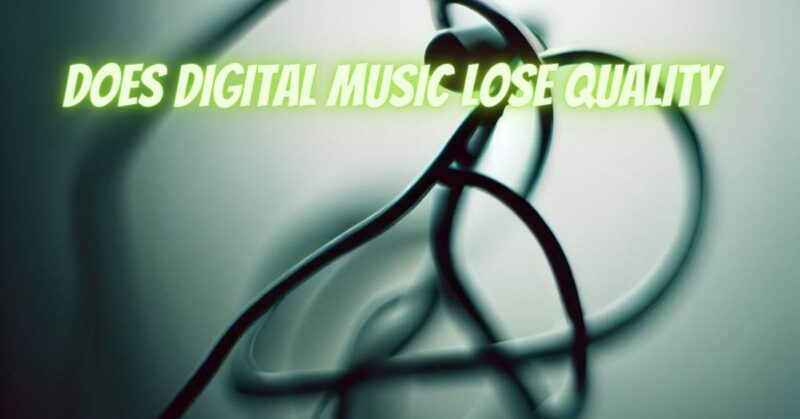Digital music has become the dominant medium for consuming music in the digital age. However, concerns have arisen regarding whether digital music loses quality compared to analog formats. In this article, we will delve into the factors that influence digital music quality and debunk the common misconceptions surrounding its perceived degradation.
Digital Music and Lossless Compression:
Digital music is typically stored and distributed in a compressed format to reduce file size and facilitate streaming and downloading. Lossless compression formats, such as FLAC (Free Lossless Audio Codec) or ALAC (Apple Lossless Audio Codec), preserve the original audio data without any loss in quality. These formats ensure that digital music retains its original fidelity and can be reproduced without any degradation.
Lossy Compression and Bitrate:
Lossy compression formats, such as MP3 or AAC, employ algorithms that selectively discard audio data to reduce file size. Higher compression levels and lower bitrates can result in a noticeable loss of audio quality, characterized by reduced detail, diminished dynamics, and increased artifacts. However, modern lossy compression algorithms, such as the widely used AAC at higher bitrates, can achieve a high level of audio fidelity that is difficult to distinguish from lossless formats in most listening environments.
Digital-to-Analog Conversion:
When playing digital music, the process of digital-to-analog conversion (DAC) takes place. The quality of the DAC, found in devices such as smartphones, computers, or dedicated audio equipment, can have a significant impact on the sound quality. High-quality DACs are designed to accurately convert digital signals into analog audio with minimal distortion, preserving the integrity of the original recording.
Mastering and Recording Quality:
The quality of the original recording and the mastering process greatly influence the sound quality of digital music. Well-mastered recordings with high-resolution source material can provide exceptional audio quality, regardless of the digital format. Conversely, poorly recorded or inadequately mastered tracks will result in subpar audio quality, regardless of the format.
Streaming and Internet Connection:
Streaming services have become a popular method of accessing digital music. The audio quality of streaming platforms can vary depending on the service and the user’s chosen settings. Some platforms offer high-quality streaming options, such as lossless or high-resolution audio, providing an experience comparable to physical media. Additionally, the stability and speed of the internet connection can impact the streaming quality and potential buffering issues.
Conclusion:
Digital music, when properly encoded and played back through high-quality equipment, can deliver excellent audio quality that rivals analog formats. Lossless compression formats preserve the original fidelity, while modern lossy formats at higher bitrates offer high levels of audio fidelity. The digital-to-analog conversion process and the quality of the original recording also influence the sound quality.
It is essential to differentiate between the limitations of specific digital formats and the potential degradation caused by low-quality compression or playback equipment. By selecting high-quality sources, using proper encoding formats, and employing quality playback devices, listeners can experience digital music with remarkable sound quality. Ultimately, digital music offers convenience, accessibility, and the potential for exceptional audio fidelity when the necessary considerations are taken into account.


